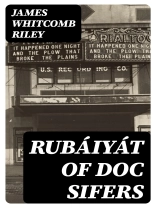In ‘Rubáiyát of Doc Sifers, ‘ James Whitcomb Riley presents a mesmerizing blend of whimsical and profound verse, echoing the stylistic elegance of Persian poetry while rooting it in the American literary tradition. This notable work employs a series of quatrains to explore themes of existence, nature, and human emotion, showcasing Riley’s unique ability to marry folk simplicity with philosophical depth. The book stands out in the late 19th-century literary landscape, reflecting the growing influence of Eastern poetics amid American literary nationalism, all infused with Riley’s trademark humor and tenderness. James Whitcomb Riley, often referred to as the ‘Poet of the People, ‘ cultivated a deep connection with rural life and its quintessential characters, such as Doc Sifers. This work arose from Riley’s experiential understanding of Midwestern vernacular speech and his fascination with life’s deeper musings, likely inspired by a desire to capture the everyday wisdom and oral traditions present in his community. His career as a storyteller and performer profoundly informed his poetic voice, enabling him to engage readers with authenticity. Readers seeking a contemplative yet accessible entry into the world of poetry will find ‘Rubáiyát of Doc Sifers’ a delightful and enriching experience. Riley’s blending of humor and poignancy invites reflection and joy, making it a must-read for both poetry enthusiasts and those new to the genre.
A propos de l’auteur
James Whitcomb Riley, often referred to as ‘The Hoosier Poet’ for his embodiment of the Indiana experience, was a prolific writer and poet whose works continue to resonate with themes of Midwestern rural life. Born on October 7, 1849, in Greenfield, Indiana, Riley’s vernacular verse and sentimental poems captured the imagination of the American public in the late 19th and early 20th centuries. Despite a lack of formal education, he gained recognition with a unique literary style that combined local dialects and humor with an emotional depth, and earned acclaim not only locally but nationally as well. A major work in Riley’s oeuvre, ‘Rubáiyát of Doc Sifers’ (1897), showcases his ability to merge regional settings with philosophical musings in a format inspired by the Persian poet Omar Khayyam. His writing often reflects a nostalgic longing for the simplicity of the past, a contrast to the rapidly changing society during his lifetime. Riley’s impact on the literary world extended beyond his death in 1916, as his poems like ‘Little Orphant Annie’ and ‘The Raggedy Man’ continued to influence American literature and culture, highlighting the importance of preserving local heritage and storytelling. His works have been a testament to the enduring charm of regional dialects and the pure joy of the spoken word.












